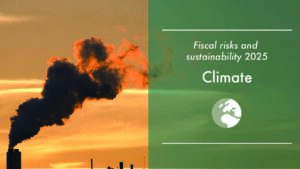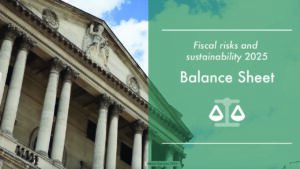Fiscal risks and sustainability 2025: climate

An explainer exploring how the fiscal costs of climate-related damage and the transition to net zero could affect the UK’s economy and public finances.
|
Government debt as a share of GDP has nearly tripled over two decades, borrowing has remained around 5 per cent of GDP for the past four years, and borrowing costs are among the highest of advanced economies. Against this challenging backdrop this interim forecast update is little changed from November. GDP growth averages 1½ per cent from next year and borrowing falls to around 1½ per cent of GDP in 2030-31, which would stabilise debt around 95 per cent of GDP. Significant risks, including from conflict in the Middle East, mean outcomes both substantially above and below this forecast are possible.
Economic and fiscal outlook press briefing: watch again below or download the slides

An explainer exploring how the fiscal costs of climate-related damage and the transition to net zero could affect the UK’s economy and public finances.

An explainer covering the risks relating to the UK’s public balance sheet.

An explainer exploring three key risks to the public finances from the pension system – rising costs, private saving adequacy and falling demand for gilts.
Asha Turner and Bronwyn Garrett | 2 October 2025
This article sets out how the OBR is developing its approach to scrutinising and assessing compliance measures, and further work we plan to do in this area.
Joshua Rawlings | 11 September 2025
In this article we provide an explanation of our forecasting process for the trend participation rate. We discuss how we use a cohort model, which combines Labour Force Survey data and ONS population projections, to inform this forecast. We also explain how we make adjustments for future changes in the state pension age and incorporate other judgements.
Lawrence Lam | 14 August 2025
In this article, we provide more detail underpinning our judgement on the reforms’ supply-side impact, specifically on the higher construction sector productivity we judged the reforms would enable, alongside supporting evidence and the resulting implications for our economy forecast.
Chloe Baker and Laura Gardiner | 12 December 2024
In this article, we explore the impact of population health on the medium-term economic and fiscal outlook, highlighting the risks poor health poses to the long-term sustainability of public finances.
Amy Nash | 11 July 2024
In this article, we set out how we put the PAYE income tax forecast together in our biannual Economic and fiscal outlooks; how new distributional analysis of earnings informs and improves our forecast; and what our latest forecast assumes about earnings growth across the distribution.
Katya Ring, Holly McCurry, Rosanna Colthorpe and Joshua Rawlings | 11 January 2024
In this article, we examine the reasons for the consistent downwards trend in inactivity for caring purposes coming to an end and what it might imply for our forecast for overall labour force participation.
Staff of the OBR | 9 November 2023
In this article, we set out how the OBR’s economic and fiscal forecasts capture the dynamic effects of policies on the economic behaviour of people and businesses.
Balint Benke and João Sousa | 12 October 2023
Our new ready reckoner allows users to obtain quick, indicative estimates of how changes in the economy affect public finances.
Luke Lanskey and Conor O’Loughnan | 20 July 2023
Our new historical public finances database contains 300 years of tax, spending, borrowing and debt data. This article tells the story of government borrowing and debt since 1700 and how the level and composition of tax and spending have evolved over this period.
Five year forecasts for the UK economy and public finances and an assessment of whether the Government is likely to achieve its fiscal targets.
Report into the main fiscal risks facing the UK and sustainability of the public finances.
Assessment of how our forecasts compare to outturn data and identifying lessons for future forecasts.
An in-depth look at the drivers of welfare spending both inside and outside the Government’s welfare cap.
Our monthly commentary on the latest public finances data and how it compares to our most recent forecast.
We are commissioned by the Welsh Government to produce independent forecasts for devolved Welsh taxes.
Briefing papers describe our work and explain the material we present.
As part of the OBR work programme we will produce working papers on topics which will inform discussion on our forecasts.
The OBR publishes discussion papers to generate debate around key aspects of its work. Our occasional papers are publications that are not part of a wider set of releases.